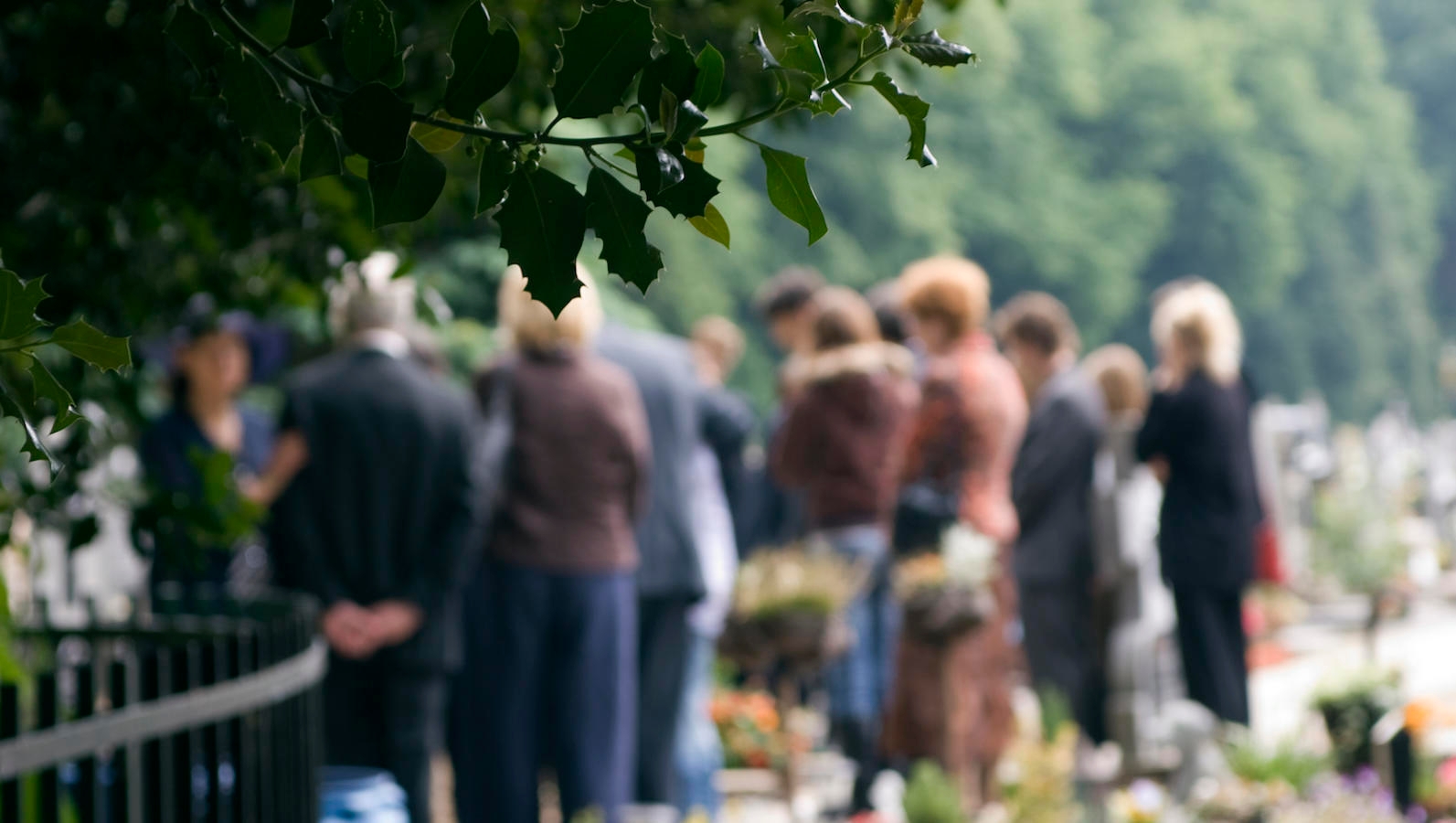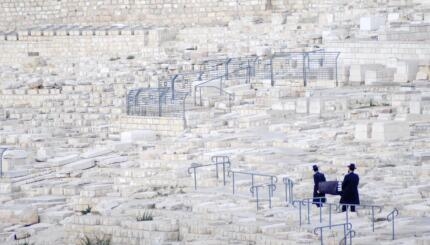Below are some of the most frequently asked questions about Jewish death, mourning, burial and cemeteries. Did we forget something important? Leave your question in the comments below or email community@myjewishlearning.com.
Why do Jews place stones on graves?
Can a person with a tattoo be buried in a Jewish cemetery?
With your help, My Jewish Learning can provide endless opportunities for learning, connection and discovery.
Can a person who has committed suicide be buried in a Jewish cemetery?
Can a non-Jew be buried in a Jewish cemetery?
Does Judaism allow organ donations?
Does Judaism allow open-casket funerals?
Does Jewish law ever allow embalming?
What exactly happens during shiva?
Why do Jews place stones on graves?
A variety of explanations for this tradition are discussed in the video below. Learn more here.
Does Judaism allow cremation?
While Jewish tradition is strongly anti-cremation, many Jews do choose this over burial, and many Jewish funeral homes and clergy will assist with the funeral and its aftermath regardless. Learn more here.
Can a person with a tattoo be buried in a Jewish cemetery?
Yes. The misperception that tattoos bar their wearers from Jewish burial is so common has seeped into the wider culture, referenced by Larry David in an episode of Curb Your Enthusiasm and prompting even the New York Times to consider the question. Though some individual Jewish burial societies may decline to bury tattooed Jews, the practice does not appear to be a common one and there is nothing in Jewish law that calls for denying a Jewish burial to an individual with a tattoo. Learn more here.
Can a person who has committed suicide be buried in a Jewish cemetery?
Yes, in most cases. Although traditional Jewish law rules that mourning rites should not be observed for those who take their own lives, most contemporary rabbis look for any basis on which to disqualify an apparent suicide so as to allow for traditional burial. Learn more about Judaism and suicide here.
Can a non-Jew be buried in a Jewish cemetery?
There are many laws and customs governing the burial of Jews separately from non-Jews. Traditional Jewish cemeteries that adhere to these practices often permit burial only of those who are Jewish as defined by the longstanding traditional definition (that is, born of a Jewish mother or converted to Judaism under the auspices of Jewish law).
Cemeteries or special parts of cemeteries owned by non-Orthodox congregations or other Jewish institutions often allow somewhat more latitude in determining who is a Jew and/or who may be buried where; some allow non-Jews to be buried anywhere in the cemetery so long as the tombstone doesn’t bear symbols of other religions, while other cemeteries have special sections in which Jews and non-Jewish spouses may be buried together. Learn more about mourning a non-Jewish loved one here.
Does Judaism allow autopsies?
Jewish tradition forbids autopsies in a general way on the grounds that the body is sacred. However, they are permitted in two specific cases: where the law requires it, or if it could help others who are immediately suffering from the same disease or condition. Learn more about autopsies and Jewish law here.
Does Judaism allow organ donations?
Yes. Despite the common misperception that Judaism opposes organ donations, on the whole there is widespread support for organ donation across the spectrum of Jewish observance, from Reform to haredi Orthodox. Some authorities, citing the injunction in Leviticus 19 not to stand idly by the blood of one’s neighbor, go further in suggesting that Jewish tradition mandates organ donation in certain circumstances. Learn more here.
Does Judaism allow open-casket funerals?
The practice of open-casket funerals and public viewings of the dead is not a traditional Jewish practice and runs counter to a number of Jewish legal and philosophical principles. The Mishnah in Pirkei Avot records the opinion of Rabbi Shimon ben Elazar, who counseled that one should not console your friend “at the time when his deceased lies before him.” This statement is often understood to suggest that Judaism does not consider rituals like a wake or a public viewing of the dead to be comforting to mourners. The Talmud also says that gazing upon the dead causes one to forget the Torah they learned.
Open caskets are also typically accompanied by some sort of cosmetic procedure and/or embalming to prevent the body’s decay. Both these actions are considered inconsistent with the prohibition of desecrating a dead body, known in Hebrew as nivul hamet. This prohibition is derived from the verse in Deuteronomy that prohibits leaving the body of an executed man overnight. The Talmud expounds on what qualifies as desecration of the dead to include post-mortem procedures that tamper with a body.
Moreover, various philosophical and mystical objections have been lodged against the practice, among them the idea that a person’s body is merely the container for their true self — their soul. In this view, placing a body on display so one can pay their respects doesn’t honor the deceased; it merely objectifies the container in which the deceased’s personhood once resided. The Jewish mystical tradition believes that the departure of a soul from the body is spiritually painful and that anything that prolongs that process, such as embalming, would aggravate the soul’s pain.
Learn more about Jewish funerals here.
What to expect at a Jewish funeral.
Does traditional Judaism ever allow embalming?
There are instances in which embalming would be allowed, such as where a body is being transported over a long distance or if there’s an unavoidable delay in burial. It may also be permitted if it is required by civil authorities. This is the explanation sometimes invoked to explain the embalming of Jacob and Joseph when they died in Egypt, as recorded in the 50th chapter of Genesis.
Why do Jewish funerals usually take place so soon after the death, and is it OK to wait longer to allow family members to travel?
Traditional Jewish law requires that a person be buried within 24 hours. The source for this requirement is Deuteronomy, which states that the body of an executed man impaled on a stake must not be left overnight because it is an “affront” to God. The Shulchan Aruch establishes this as a general principle but also delineates a number of situations that would justify a delay, including allowing time for relatives to assemble or to gather burial shrouds. In addition, circumstances sometimes necessitate a delay, such as when a person dies on the eve of the Sabbath. Since burial is prohibited on the Sabbath, burial is often delayed until after. Today, many non-Orthodox Jewish families delay the funeral several days in order to allow loved ones who live far away to be there for the event. Others opt to have a speedy funeral, but then hold a memorial service at a later date when more people can attend.
What exactly happens during shiva?
The shiva period is the first seven days after burial, when mourners traditionally stay home and receive visitors. While there are numerous laws and customs associated with shiva, many non-Orthodox Jewish families choose to observe some, but not all of these practices. For example, a family might sit shiva for fewer than seven days or might specify visiting times so that individuals do not feel obligated to have visitors in the house throughout the day. Learn more about shiva here.
Sign up for a Journey Through Grief & Mourning: Whether you have lost a loved one recently or just want to learn the basics of Jewish mourning rituals, this 8-part email series will guide you through everything you need to know and help you feel supported and comforted at a difficult time.
Looking for a way to say Mourner’s Kaddish in a minyan? My Jewish Learning’s daily online minyan gives mourners and others an opportunity to say Kaddish in community and learn from leading rabbis.
Mishnah
Pronounced: MISH-nuh, Origin: Hebrew, code of Jewish law compiled in the first centuries of the Common Era. Together with the Gemara, it makes up the Talmud.
Talmud
Pronounced: TALL-mud, Origin: Hebrew, the set of teachings and commentaries on the Torah that form the basis for Jewish law. Comprised of the Mishnah and the Gemara, it contains the opinions of thousands of rabbis from different periods in Jewish history.
halacha
Pronounced: hah-lah-KHAH or huh-LUKH-uh, Origin: Hebrew, Jewish law.



